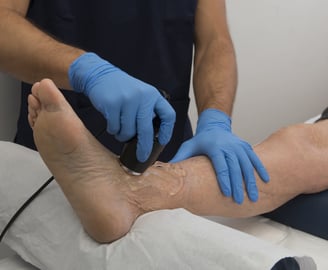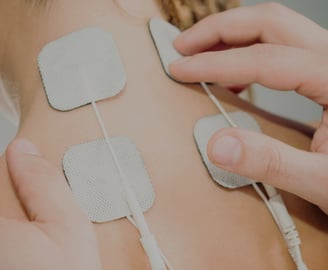Whiplash Injury Rehab
Whiplash typically occurs when your head is forcefully and quickly thrown backward and then forward, which typically happens in Motor vehicle accidents. This motion can injure bones in the spine, disks between the bones, ligaments, muscles, nerves, and other tissues of the neck.
The symptoms of a whiplash injury include neck pain, neck stiffness, difficulty moving your head, headaches, pain, and muscle spasms in the shoulders and arms.

Typical car accident injuries include:
- Muscle strain
- Joint damage
- Broken bones
- Concussion
- Whiplash injuries
- Back pain
- Herniated discs
How Can we at Resilient Healthcare help you with these injuries?
Untreated whiplash injuries can lead to chronic neck pain and structural problems in the neck. A physiotherapist can effectively treat the symptoms of a whiplash injury. The treatment techniques help to minimize pain and promote neck range of motion.
Physiotherapy is one of the most effective ways to deal with injuries sustained in a car accident. Our physiotherapist uses the most effective, evidence-based treatments to ensure your relief from symptoms. We work together with your needs to reduce recovery times and help prevent long-term conditions.
The following are some of the most effective treatments
- Targeted manual therapy (i.e., myofascial release, trigger point release)
- Soft tissue massage
- Joint and soft tissue mobilisation
- Postural corrections
- Range of motion exercises and specific stretches
- Modalities for pain relief (i.e., IFT, ultrasound therapy, etc.)
- Progressive strengthening exercises
- Nerve mobilisation exercises
Frequently Asked Questions
What should I wear?
On a first session, your physiotherapist has to do a thorough assessment, which involves a lot of joint movement and tests, so loose clothing at the area affected would help to do a detailed assessment. Please avoid using very tight clothing, which can affect the outcome of the assessment.
How do I book appointment?
To book an appointment At Resilient Healthcare Walsall Clinic, you can call us on 07859757700, email us at info@theresilienthealthcare.co.uk, or book online at our website www.theresilienthealthcare.co.uk
Physiotherapy Solutions
Physiotherapy helps to regain, maintain and improve normal activities when it is affected by injury, pain, illness or disability. Physiotherapist can undertake an extensive subjective assessment, physical examination, investigation referrals, diagnosis, medication prescription, joint injections, patient education, health promotion, management, prognosis, disease prevention, physical intervention, rehabilitation andlead chronic pain management program. Physiotherapy management includes prescription of specific exercises, manual therapy, manipulation, soft tissue massage, deep tissue massage, sports massage, use of electrotherapy modalities such as Ultrasound therapy, Interferential Therapy (IFT), Shockwave Therapy, hot and cold therapy and Laser therapy.

Deep Soft Tissue & Sports Massage
If you can feel the tensions building up in your muscles through sport or through being on your feet all day

Acupuncture
Acupuncture is an ancient Chinese procedure designed to target certain areas of the body to eliminate pain

Work Related Injuries
Rehab
To safely return the wounded worker to work, provide a progressive and individualised therapy program

Chronic Pain Management
There is currently no solution for chronic pain, other than identifying and treating

Joint Injections
Joint injections are non-surgical procedures in which anesthetic and corticosteroid solutions

Whiplash Injury
Rehab
Techniques to minimise pain and promote neck range of motion may be used in the beginning of treatment.

Shockwave Therapy
Shockwave therapy is a non-invasive treatment that involves using a gel medium to apply

Electrotherapy Modalities
Electrotherapy modalities (also known as electrophysical agents) are methods of physical therapy

Kinesio Taping
Kinesiology tape is a therapeutic tape that is carefully applied to the body to give support
